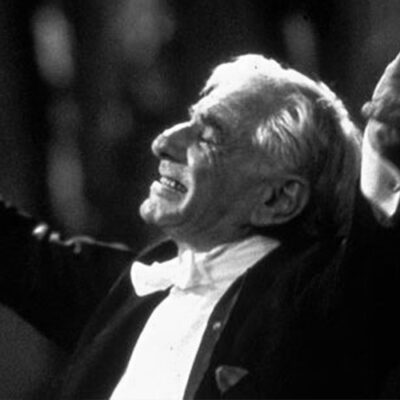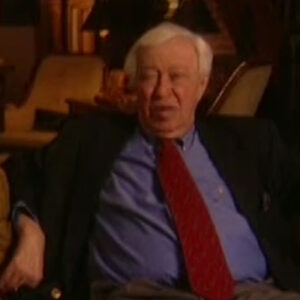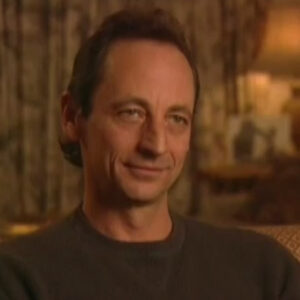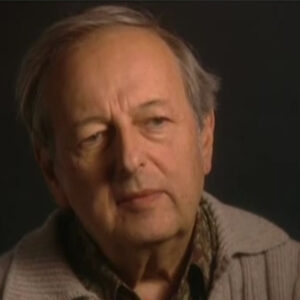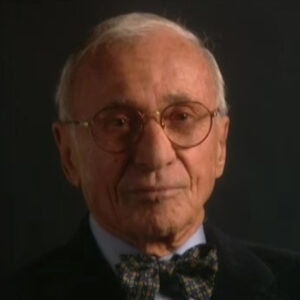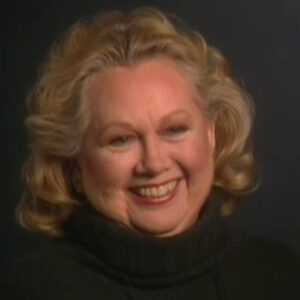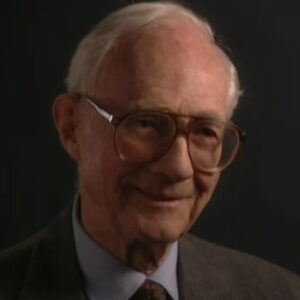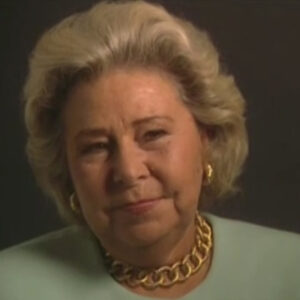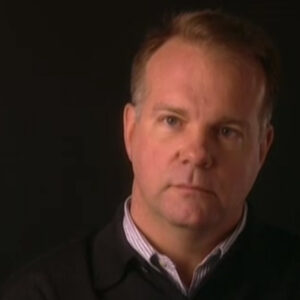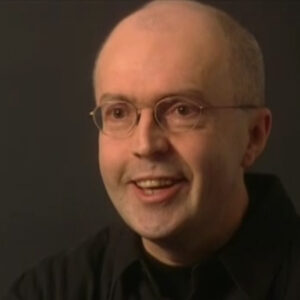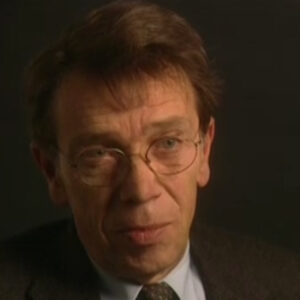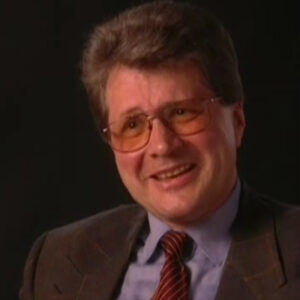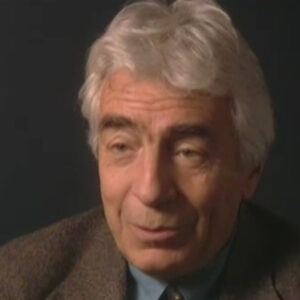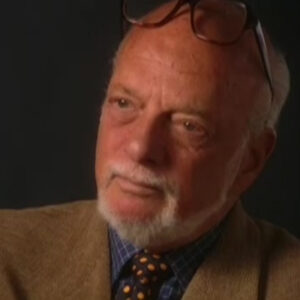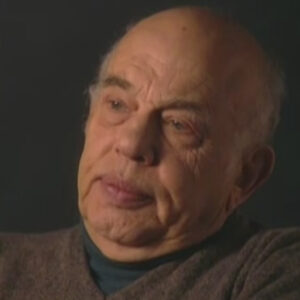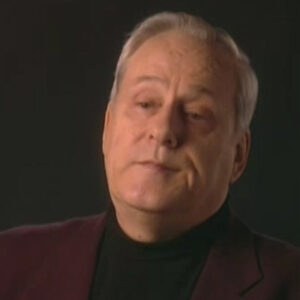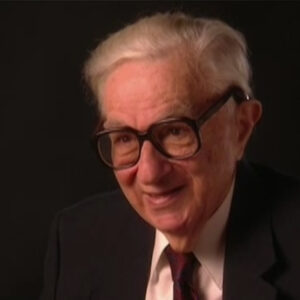Speaker When I was 19, I went to Kurtas from from. From Chicago and I had a scholarship to Curtis Institute where I lived. Pristine life and a friend of mine suggested, because I used to go up to New York to get drunk and into other kinds of mischief and also to go to concerts, including the complete Beethoven cycle played by Schnabel. And she told me to look up Lenny and I just knocked on his door not knowing you don’t knock on people’s doors anywhere, especially in New York. You’re supposed to phone first, but. In retrospect, I can see why he let me in, I was pretty cute and he was rehearsing with David Oppenheim, his clarinet sonata.
Speaker And this was on Fifty Second Street, right next to that expensive restaurant with the name of the 21 Club, which I guess was there then too, but I don’t know that this block still exists, as it used to in a second story, walk up with a living with a woman named Edith who took an immediate dislike to me.
Speaker And I had no feelings about her whatsoever, and she dislike me because I sort of hung around and he didn’t discouraged it, and I was really quite dazzled by this as well, by him. Everybody was, but not the same way. I didn’t fall in love with him or anything of that sort, but I was dazzled by his immediate. Connection with music, his ability to sight read, his ability to attach anything that was said about sex or painting or philosophy or or vivisection to music. Because that’s what he was quite literally made of and he had enough energy for seven people, and if I sat down at the piano and thought he would sit over there. So what, you’re doing it all wrong. He was not so gentle, but at the same time, he was loving. I think he thought of me then and continued forever afterwards as sort of a nice little Western guy who never got the point but who wasn’t a fool. And I got in the habit of whatever. I went up to New York and just crashing in his pad and.
Speaker I wouldn’t say we had an affair because because I was not interested, maybe he wasn’t either, but we did at four or five in the morning, have to sleep in the front room. There was a big mattress. And Edith, who had some sort of an all night child, would not be amused when she came home and saw this mess down there.
Speaker And I remember also that he drank quite a bit. He would have been 24. And I was very impressed by his having a shot of or maybe two or three of scotch at night in the morning before giving a lesson, because I drank quite a bit and continued to for years, but not in any problematic way at that point. Which I think in retrospect, he did, but then you can’t nobody can know what effect.
Speaker We all have different metabolisms, and he was able, at least for 35 years.
Speaker Not to lurch around when he drank.
Speaker That very same summer, and this would have been February, it seems to me that he had a job. That he got a job because I remember sitting with my sister in an outdoor cafe. She had come up to see me and we went to New York together on 53rd Street and who should be from a obliquely across the street. But Lenny and Helen Koch, who was his former piano teacher now, who would soon become his assistant rather than to avoid the word secretary. And he said, I’ve just had some mildly good news. I remember this phrase because my sister reminded me of it. I wouldn’t have would have forgotten it. I’m going to be the assistant conductor of the Philharmonic and his whole statement, again, without the insertion that what I said. He said I just had some mildly good news, which is his way of telling you something stupendous. I’ve been I’m to be the assistant conductor under Rojansky of the New York Philharmonic.
Speaker And that was that, and I think it was a question of month, wasn’t it, before Bruno Walter got sick and he had to do the substitute thing, I think it was still in 1943 was at 43. And I remember in February, in all probability in February and saw him regularly because he moved from Fifty Second Street to the Chelsea.
Speaker And I remember I would borrow money like a dollar, which is a lot of money to get you back to Philadelphia and get you a lot of drinks. And and I was very good about paying back because I was a Midwestern boy, taught to pay back your money, whatever you spend it for.
Speaker And then everyone said, isn’t it wonderful about Lenny? He’s not a bit changed now that he’s a world wide celebrity, except he always acted that way and there was nothing to change from to. He had a certain assurance and a certain steady income. And I also remember that very, very shortly after he repeated a Pittsburgh performance that he had done in New York, in New York, he repeated a Pittsburgh performance or was it with the Pittsburgh Symphony that he did the Germanized Symphony and Jenny Tural sang the premier? Was that in New York or was it there?
Speaker I was at the New York premiere.
Speaker I’m just wondering if the piece had might have been from your partner in Pittsburgh and Jennie Terrell, in all of her grandeur, sang and sat for the first two movements without looking to write in her left and then stood up and sang this the Jeremiah part. And I’d never heard singing of that sort before. And also she was a how shall I put it, plain woman like a kind of a plum pudding with a mouth who could give in, like really good singers could give the illusion of being a great, great beauty because she thought she was beautiful. And when she opened her mouth, when she came on stage, she was a star and whirl around and wear these terrific clothes. And then all that nonsense was over. She opened her mouth and deliver the goods. She was my favorite singer up until the present moment. I just loved her very much. And Lenny loved her and he owed her a great deal and she owed him a great deal.
Speaker What was the nature of their relationship? I’m sure it’s platonic. Why did didn’t mean and the oh I remember some kind of a somebody that actually sort of a mother.
Speaker She told me that he she kind of hired him as a rehearsal pianist and he came and they played together after which he said, gee, you’re good because she was and she knew it too. And their repertory was similar. But she was a kind of a humorless.
Speaker Well, Russian, Canadian and.
Speaker Thinking back to her, her her glamour was in her singing, but not in her personal.
Speaker She was so filled with herself that she was very hard for her to have a conversation about anything except her own self, which is true of all.
Speaker A lot of things like people not not. Yeah, um.
Speaker Tell me about all this, this time in New York, that where you were before we get to meeting someone from your man?
Speaker There are a couple of stories that I thought if you could tell, one was about meeting the reviewers.
Speaker Oh, the second time I went to Lennie’s. I guess I was expected, but all I know is that he would live. He lived maybe on the second floor, but possibly the third. And as I walked up the stairs, I heard this. Delivery of several voices of various sexes, which sounded terribly to me, very New York and and hence very glamorous, and he introduced me to all of them. And that which was Judy Holiday and Adolph Green and Betty Comden, who I still know, we’ve never become friends, but we’re on the we’re staunch acquaintances. And I very much admired them. And he said we’re just rehearsing something that we’re going to do tonight at the Cafe Society, which was a nightclub in Sheridan Square Cafe Society downtown, called called. So I went with him to and saw them do what I saw them do another and hundreds of other times in the ensuing years, they all did simultaneous imitations of Lionel Barrymore, for example, wringing their hands a little bit of what used to do. And they did something that Lenny had written for them and they drank a great deal. And Judy, Holiday was beautiful and neurotic and the others were. Stable, but perhaps less beautiful, very calm, look pretty good, I guess, and the fourth one was a man whose name I’ve forgotten and who I think about something, then he left him.
Speaker Yes, a slight physically slight guy.
Speaker I can’t think of anything more Lenny played for them, but that was just for that night, he didn’t have he wasn’t employed there. He later did the same thing across the street at. The Village Vanguard. I think I should mention that the music that he wrote then, like the clarinet sonata when I went back to Philadelphia and played it for friends. Was terribly infectious to me and also right off the bat, so many pieces that I liked and that he liked, we like together even today, now 50 years later or more in conservatories, the same old 19th century. Repertory is still crammed down the throats of all the young people, they know Brahms, they know everything, but they don’t know of Stravinsky, which I knew very well from the same recording that Lenny had known it was in English. They don’t know John old Carpenter. They don’t know Vares. These are still outrageous contemporary composers, even as much today as they were in those days. And so Lenny and I also I think he had an essentially French temperament, by which I mean as distinct from German, because there’s only French and German in the whole universe, either one or the other. And if you’re German, you. Dig deep, but you don’t spread out, you analyze until the cows come home and the French are superficial in the most profound way and it’s superficial, like a blade of grass for one split second in the sunlight or a little girl’s apple cheeks loftily. SORTILÈGE of Ravell, for example, was a piece nobody nobody knew then except me and him. And I don’t know that there that many people today who know it anymore. So we had a great deal of shared musical interests. As for Copeland, the only piece of his that I knew at that time was Quiet City, which I had heard in Chicago, played live and and said to myself, gee, is this American music? It is something because American music was Kopenawa. I didn’t know it. I kind of knew Roy Harris, his third symphony, and Lenny then played El Salvador, Mexico, on the piano for me and the Copeland Sonata and anything that I wanted. He was very, very generous with his time and and with his repertory and with his. I’m stingy, I don’t like to give away what I love, but he’s the very opposite. He if you love something, you’re torn, you want to share it and you want to keep it. But he and that’s and that’s because he’s a conductor, among other things, wanted to share it. And so he did. So I think I learned a great deal, not everything, but a great deal from him. An attitude more than repertory.
Speaker He once said, I haven’t actually talked to him, that I remember.
Speaker So when I read it, that his nature was so great and to communicate something that mattered to him that he said, if I see us, if I see a sunset and there’s nobody there to share it with me, to look at and share this experience and talk about the sunset doesn’t exist for me. I mean that it was and have to.
Speaker I can understand that. I can understand that I gave a party once and it would have been, let’s say, 1965. A lot of people there in the place, across the street from where we are now sitting, by the way, just a dump. But and there was a girl there. I don’t know who she was. And she said, oh, you’re Lenny Bruce. And you think you’re something terrific. I think you’re a big fake or words to that effect, something impolite. And instead of telling her to go jump in the lake, he went out onto the stairs with her in the little walk up apartment for an hour, talked to her and talked to her. He just hated not to be loved. And that famous quote, because I just read it in a book about a book of quotes that he said to me once. The trouble with you and me now is we want the whole everyone of the world to love us. That’s impossible. You just don’t meet everyone in the world. He denies ever having said it, but he did say it was one of my favorite.
Speaker It’s a great it’s a great thing that we have to we don’t have to be true. It has to be true. Of course it’s true. It’s why I say.
Speaker I don’t know, he would deny anything.
Speaker And then remember things we all remember the past in our own way, I remember where he said it and the circumstances before I went to Europe. It would be about 1940, seven or eight. And I bumped into him drunk at 4:00 in the morning. I was drunk on a street. And so he took me home and I passed out. And the next day I said. When Helen came in without the least bit of embarrassment, he arranged for her to fix breakfast for me or. If are a maid or somebody during which because he was still nauseated from the night before smoking pot, was talking to me and giving me advice on.
Speaker On the way, I lived my life.
Speaker I think it’s important to say that he was a lot more than just an anecdote to me, and none of this would mean anything if it weren’t that that he did perform my music. And that’s terribly, terribly important in 50.
Speaker He looked at my music for years and years without ever committing himself to it, but he was I think he was interested in the music of all of everybody, and especially young Americans in 52, when I came back to America, having lived in France, where I would continue to live until 58 and where I saw him quite often when he came over. I remember him looking or listening to a tape I had for my first symphony and saying that Jerry should choreograph it, which he never did, and then this and then that.
Speaker And then finally I wrote a piece in 57 and showed it to him and he said, I’ll play it.
Speaker If you re orchestrate the slow movement for justice, strength. And I said, OK, but didn’t deliver the big symphony. Third Symphony, any of all of my pieces that he’s performed, he said, I’ll play it on the condition that you do this. And I would say OK. And never did in this case because he wanted to have his stamp on it. So he played the Third Symphony. And like all composers, I judge ensuing performances by the first performance. No matter who does it, it’s the first performance is lousy and the second performance is great. You still have the first performance in your ear against which to compare. I think this piece was very much his cup of tea. I also remember the first rehearsal of it. I had written the music for suddenly last summer, a tentative play which was taped rather than played live backstage. And yet for me to get a residual, I had to be there live to run the tape machine or they would fire me. And I said, so fire me. And they did, which meant that I got cut unemployment insurance and I was at the unemployment line waiting in line five, three or seven when the first rehearsal of my symphony was what took place. And I walked in late and he was not amused. But I also remember his. Just sight reading the second very fast music, not sight reading, make them play up the tempo, which is a very Bernstine hot stuff movement, and they played the hell out of it. And I was absolutely thrilled. And then he performed at four times. I still remember the four people that I this was in 1958 that I excitedly brought to the to the concert, to these concerts. Audrey Wood with one. She was an age name ring, a bell. She was an agent for actors and playwrights particularly. And she had thought of representing me as her first and only composer, which she did for a little bit. Valerie bettas with another who is a. A rather remarkable dancer, a remarkable presence on the stage, and she and I had done a ballet together on a Truman Capote scenario from other voices, other rooms and my sister and a fourth personality. You know, he did another piece. Ten years later, which is called Sunday morning and.
Speaker The.
Speaker Main anecdote about that is that I was he did a Copeland piece in a few months piece, three of us were sitting in the box and when my piece came, he started coughing. The piece was in 10 movements. And at the end of the second movement, he just put it on his back and left the stage and. Shirley Bernstein and Ellen Adler in the box next to us. And finally, there was silence. Nobody did anything. You didn’t come back. You didn’t come back. And and Shirley Brounstein went backstage and then came back and said, well, he had a hemorrhage in his throat. He had a biopsy this afternoon, but he’s back stage smoking, so he’s happy. And then he came on and continued for he had left off, which kind of ruined the momentum, to put it mildly.
Speaker And the started goes, well, he should have, but I don’t know what the rules are when you’ve had a biopsy and bleeding in the throat.
Speaker And the third piece you play with the violin concerto, which. Which had already been played, it was not a world premiere at all, and he said it piece ends. Slow and I think and with a rousing so for so let’s transpose let’s play it clear through and then we add 30 measures from the preceding movement, which is sort of hot stuff. And Gidon Kremer, who’s not an idiot, agreed as a soloist. But I still and that’s when I took a bow and fell on my face for all these terrible things happening on the stage of either Carnegie or Avery Fisher Hall, if you fall after whatever, he played a piece.
Speaker I came out to take a my. Yes. Yeah.
Speaker They didn’t care about me. They cared about me. They would recoil in horror. Here he comes again to break our violins all over again.
Speaker All of this is to say that I’m honored and thrilled by him as a conductor, but are. And this is where he isn’t French because a lot of his repertory is Mahler, as you know, and and Haydn. Haydn is French, but Mahler ain’t. And he can’t not milk a phrase.
Speaker And I feel that, for example, a composer like Ravel just play. Would you see please don’t interpret because all of the nuances are written. On there, on the page, slowing down the dynamics and the very colors, if the instruments just play what is before them, it will speak. It doesn’t need to be needed. It doesn’t need to be stretched like taffy. And I’m flattered that he would. I’m flattered when any performer and there’s no such thing as the ideal performance, it can change from day to day, even in a composer’s mind. You, I feel faster today than I felt yesterday or something. And it and it goes on into the performance of a piece of music that was written many, many years ago. I prefer. I love him, so forth, I prefer a. A performer who I don’t think my music needs interpretation, let’s put it that way, but but I’m not complaining.
Speaker When you perform working for his own interpretation.
Speaker He had to make it his own, which is why he would say, well, after I fell on my face and we have played it this way twice, given the violin said on stage to us tomorrow, let’s play it the way it was written. And because you can have long conversations while people are clapping and nobody knows what you’re talking about. And so they did. And he finally recorded it in that way. I think I think he done. Kramer’s marvelous and I think he’s marvelous and I think everyone’s marvelous.
Speaker What is it that Lenny used to say to me posing as a conductor that to talk about that and you have to, in a sense, almost inhabit the composer because he was. I was. And it was very difficult for him not to bring composer’s sense to the music.
Speaker I’m not a conductor, so I don’t know that. And I never got the bug the way composers do once or twice. I’ve conductor because I’ve had to and I’m done that. I also look to the orchestra. I don’t know anything. So if I come in wrong, please come in. Right. And at least I wasn’t being pretentious, but I didn’t get left to be an absolute monarch at all. Therefore, I can’t know what it means to deal with other people’s music, although I play it on the piano when I’m playing, say, Poulenc with a singer, I think I mean, it’s just as important as the singer and I also imitate. I think I’ve become Poulenc by virtue of having imitated the many incredibly.
Speaker Moving performances of his and as a French composer and a French performer, he didn’t have that sort of passive way that Americans are companies can have. He would make just as much noise as Bernie Mac with whom he was playing.
Speaker But I’m curious about that because it makes I can certainly understand why Lennon’s attempting to re orchestrate your peace would not go over well with you.
Speaker But but I by and large, I’m a little bit confused why Lenny came under such fire for bringing his personal interpretations to the repertoire. When Horowitz is lauded.
Speaker Oh no. He came under fire to it certainly came under fire, too. And also these things change with every generation. If when Horowitz was a big star, or at least when I was a kid, when I was a teenager, Horowitz was a big star. But people talk about his vulgarity in things like Scarlatti because he would play Scarlatti awfully fast. That had to do with the period which he lived rather than the 18th century when Scarlatti lived. We don’t know how Scarlatti played. It’s possible he played it twice as fast or twice a slower missed a lot of notes. When you hear when you hear recordings now of Bogner, not to mention Debussy and Ravel, Ravel had no not the least sense of how to play his own music. He was a 20th century composer trapped in a 19th century body. And he would and he would do play it meaningfully. I can’t it makes me shudder to think about it.
Speaker And Debussy simply missed all the notes playing with Mary Garden or playing in the piano roll things. So I think that Lennie’s he had the Bernstine way, but it was also a way that had to do with the generation in which he was born. I’m not against. I’m not there is no authentic way to play anything, and certainly a composer’s way of playing his own music isn’t necessarily authentic. And I think also, once a composer has written his piece is no longer his or hers, it it’s theirs. And if I have to play a piece of mind, it’s written for the piano with the singer written many years ago. Every time I play it, I say, God, I wish the composer hadn’t made it so difficult. I wish, ah, I wish I had redone this phrase ever so slightly. I think it’s very dangerous to do that the way you see poets in the collected works 30 years later who who always for the words amputate and Auden Auden would would be too much with his poems. But he’s no longer the same person who wrote the poem 30, 40 years ago.
Speaker I think it was 1968. Was it when MacDowell Colony asked me to write a medal for Lenny and I did. And I meant every word of what I said. Exactly Eighty-seven, same thing 87, 10 years ago. So I wrote this thing and I went in an aeroplane from Nantucket to the MacDowell Colony and stayed overnight and everybody was very nice. And then there was a big tent and there were 12 million people waiting to see Lenny and William Schumann was going to introduce us all. But Lenny didn’t come and he didn’t come and he didn’t show up and people were twiddling their thumbs.
Speaker And in retrospect, I know what was going on that I think Lenny was very nervous about what I might say because I had the reputation for being. Saying whatever I felt like saying, I still do, on the other hand, this wasn’t off the cuff, it was a carefully written essay and it was an homage. And I said to myself, what do I know that nobody else stresses? But that I think is crucial to learning in any way.
Speaker Then he showed up and and the gates just banged down when he when his his presence, although he was he was not a lot of the energy that he had in the last 10 years of his life, which was counterfeit. He was supposed to be.
Speaker Super energetic, and so he played the role of he was super energetic, then there was some song sung and this and that, and he was sort of cool to me on the stage because we were all sitting little row doing each to do our special number. And then Schumann got up and gave in introducing him and said, and that is certainly going to talk about sexiness. One thing he knows about is that and I just cringed because I wasn’t going to talk about sex. And I think he was trying to pave the way to what horrible things I might do. And I got up and carefully read my speech.
Speaker And with Lenny sitting about there and as I did, it was very moving to me to see him.
Speaker Reacting, listening carefully.
Speaker Feeling relieved, I think, and impressed to a certain extent, and when I finished, I because I’m the dumb girl, I just said I’m done.
Speaker And he got up with tears in his eyes and a lot of kisses and that sort of thing. And then he he he gave a speech about my speech afterwards.
Speaker It’s written well, he and he also gave a speech about Human Speech Preview. And that’s something I can’t do very well, because he had listened enough to be able to tie up some of the threads. I think he was also weary of hearing about people talking about the West Side Story, which I avoided talking about because and my point was that his music is all theater, but of course, all music is theater.
Speaker It can be argued that since we introduced it, I think I told this before. I would say it again. I think your essay is the best thing I’ve read. And I read everything about it. There’s a question of that.
Speaker And we when it was over, everyone so relaxed. Suddenly Perry Crout phoned from Tanglewood and the thing was, OK, we can leave, we can take the chains off of Ned Rorem because all is forgiven. Exactly, exactly. And a lot of people who had been a little nervous, I forget I think it has to do with men because it could be. But it’s not my book. It’s Joan Places, for Christ’s sake.
Speaker It’s as you wrote yourself. I mean, I would say is because you wrote that there was a lot of friction around that book in general.
Speaker People I rather like Joan Shirley Bernstine or something.
Speaker I think Joan I like John Paiser, you know, her.
Speaker And I got into it.
Speaker And I think I think that she cares about what she does and she does in her own way scrupulously. She did a book on Gershwin and another one on Undulations. And so for them she is. But again, it’s not my book, it’s hers.
Speaker I read an interesting interview with her in a book, Conversations Lenny.
Speaker And I actually think that she is a huge admirer because I don’t think that she thought she was writing the book.
Speaker Well, the things she’s doing is one better. And I mean, she knows about music and some of the other.
Speaker But did she, in fact, say things that Meryl Streep did not say it was? Or was it the tone? And certainly and I you know, I mean, Lenny started off co-operating with her many the support may have succeeded in this film that told me that I know that when the slight edge to the time it was the day the book came out, she told me she got in and she got her complimentary copies, got in a taxi, went up to the Dakota and left it at the desk in homage with an inscription. And she wondered and wondered and wondered why she never got a telephone call about the children, you know, reading every year. Well, people say that, but he maybe he didn’t read it.
Speaker As we were saying a while ago, one wonders about everything except oneself. Joan didn’t know about herself, but she knew about everybody else. And again, one can’t see you can’t see yourself as others.
Speaker See you.
Speaker What do you think Lynn didn’t know about himself that others knew?
Speaker I don’t know.
Speaker I don’t know, but I’m thinking in terms of Joan plays are not doing well and he didn’t didn’t respond, but it’s so true of all of us that people like us more or less than we think or or I don’t know what are we not as smart?
Speaker We’re not as dumb.
Speaker Or, again, this constant, constant, constant change. There is no truth. There’s no there are no there aren’t even facts any longer because there’s only perception of facts, I think.
Speaker And one I think one tastes musical tastes are formed pretty early in life.
Speaker And I think as life goes on, you don’t your taste doesn’t broaden. I think it narrows. I think the same the same goes with.
Speaker Well, with everything. I don’t know why one has French tastes or German tastes or this kind of taste or that kind of taste. I don’t also know about one’s enthusiasm. I’m not as enthusiastic at all as I used to be about listening to music.
Speaker I never go to concerts, never going to opera, ever go to the theater any more. But I’ve done an awful lot of it in my life. And if I were wrecked on a desert island, that famous question, what would you take? I would take my memories of of the ideal performance rather than this person’s records or that person’s records. And when I’d sometimes look back as we were talking about Horowitz a while ago, I look listen to a recording made ages ago that I loved. And I don’t love it anymore. Yes, we were talking about Lenny stretching the point in in Mahler and by extension in pieces like mine that don’t need stretching. Maybe I’m wrong. Maybe just need stretching whom I just wrote it.
Speaker But but being a composer is not the same as being a novelist or being a painter, where the finished product is there to be interpreted in a person’s mind, but not in their ear. In the case of music, it’s unique. It’s more unique. Is that good English more unique than a play? Because play can be read by anybody, but music can’t be read by anybody.
Speaker What a one time score in that, if you can’t score, can’t exist without lots and lots of other people jumping the line, so and then they can bring it alive and all sorts of weird ways. Sometimes I’ve taken little risks in orchestration, for example.
Speaker Or in anything and performer will come along and or group of performers, and after a certain amount of experience, what you compose is going to turn out to sound pretty much as you had in mind. But a composer’s first experience with orchestration, for example, and hearing all of these total strangers playing flutes and harps and so forth. Are you did did I or didn’t I? Or is something too loud? Is the balance correct? It’s very, very thrilling in a way that I don’t think any other creative artist. I mean, the orgasm of hearing your own music, well played for the first time is something that no author.
Speaker And no painter and maybe no playwright can have.
Speaker You wrote about hearing your work for the first time and that, in fact, you had not really have a great intellect.
Speaker That’s true. And the first piece, the Third Symphony, which he did the world premiere, and it’s very it’s a lot of fun to have the New York Philharmonic do the world premiere because it’s not like some student people flopping around, like reading it. They played it. I might add, however, that when Lenny went back to the New York Philharmonic. Well, this was in 1958, I think whatever he did, my violin concerto, the New York Philharmonic, was at an all time low and they sounded really dreary. And they may have loved his being a guest composer again, but they didn’t sound so hot. And he in my piece, for example, he there’s some just simple scales. Which I mean, simple scales, my music is not complicated, but then simple music is a lot harder to play. Simple music played badly is much worse than complicated. Music played badly because you can hear any one can hear what goes wrong. And he was so sweet and so patient with the orchestra. The second day of rehearsal.
Speaker Have you practiced violins? He was not a tyrant. He wasn’t mean. I’ve seen him be mean, but he wasn’t. He wasn’t mean. Meanness would come.
Speaker I think I think temperamental stars, if they’re really stars and really the right thing, I once said I saw Lenny in Milan once and he was there conducting Carlos in two operas. What about the sleepwalker? Yeah, and I think he only just anomalies. He offered another one, but he didn’t. I said, so how is she, what’s she like to work with? And he said, she is fantastic. She knows what she wants. She’s quite bossy and she gets her way, but she’s always right. And so she saves an awful lot of time just saying do it this way. And she’s very nice. She saves the the obituary or the temperament for parties. The same with Lenny. I never saw him at rehearsal being anything but caring. He would waste an awful lot of time telling anecdotes about Kafka or or something to show how very erudite he was, which I guess he was in a way. And the orchestra wouldn’t I don’t know what they were thinking, but he was flattering to them by sharing these ideas. But he was never he would never single out a single person and say, you fool the way Toscanini would. Although I remember at Tanglewood in 1946, he did Peter Grimes, and he was really awfully young and this great big fat piece. And I remember going to a dress rehearsal and he said, What’s the matter? Cello’s is so dumb today, but that’s him talking. It’s not him being hostile. It’s him being sociable. Let’s wake up, we’ve got such a certain amount of time to get this under our belts, and so let’s do it.
Speaker Well, it was interesting that he would never be cool, too, and he wouldn’t be cruel to people who couldn’t fight back. I remember at a dinner party, there’s nothing I can say. I’ve written down better.
Speaker But my friend Jim Holmes, who’s a friend of 30 years and this would be when 15 years ago we in two or three other people were at a dinner party and learning that I’d known each other since the beginning of time and the other people hadn’t.
Speaker And Lenny was being again, the way he talks to not talking about the meaning of it all and this and that, I think it would have had a tonic otherwise. And I said, OK, we’ve talked enough about that. Let’s not let’s not talk about this.
Speaker And he said, Ned, you are such a fool. You are so superficial. You’re such an asshole. Cut that because I don’t like the word. But that’s what he would say. And I’m not. But he was showing it off in front of other people being unthinkably rude, his own table.
Speaker And I almost got up and left, in fact, I’ve got to get up and left and he said, listen to Jim, my friends, and he’s the intelligent one at this table. He’s the one that can see deeply. He doesn’t change the subject when when the subject hasn’t even been got into and blah, blah, blah. I also remember that a year that I gave that I wrote that up in a book, I gave the book. This is many, many years later. I gave the book to Gideon Kramer, whom I scarcely knew, and. Who will play my violin concerto? But again, at the final rehearsal, he didn’t show up, he didn’t show up because he’d gone to Europe to see his girlfriend, I think, and the plane was late and everyone was nervous. And then he did finally show up five minutes in and he said, in Geelong, you’re such an asshole, which is the last thing in the world is what did. And he burst out laughing. And he later told me the reason I started laughing as I was reading your book on the aeroplane, that Lenny goes around saying this to any anybody he could be, in that sense, cruel.
Speaker If you do that to a person you don’t know, you can reduce him to tears and.
Speaker As he got older, I suppose you’d say that after Felicia died.
Speaker I’m hardly the first person to point out that it was a that he even said, I think I’m responsible for her dying and he felt very guilty about this. But the guilt was assuaged by. Being free two of. Of that responsibility of being married, the children were grown up and these are personal things to say, but Lenny was a very public figure and so say them to and he. I’m not sure that he became any more promiscuous homosexual than he ever had been, which was pretty promiscuous, but he became a little more outward by it. I don’t think Felicia was amused by that at all about the children. I wouldn’t know. But I think they so I can’t speak for them. And they’re all alive and thriving and perfectly happy, as far as I can tell, and within their terms and in a different generation. But I think at the same time that Lenny, after Felicia’s death, I think she was a good wife.
Speaker As those things go and putting up with him, my God, they knew and I knew her from 46 when she was at Tanglewood and I never really got along with her very well because, like, there’s a whole breed of female, which is the conductor’s wife, unquote. You see them backstage with the conductors who are always male conductors, are big babies, all of them. And Peter, people in the green room buttering them up and mezzo soprano is what they want to sing with them and this and that. And the wife is stoically sitting there. Well, as though to say you can have him now in the green room, but he’s mine. Felicia was didn’t go to the green room, except except when she did and she raised the children and she’s had a career of her own with a certain responsibility to it. And she was very pretty. She dazzlingly pretty. She wasn’t beautiful, was very pretty.
Speaker And I think she kind of I think she’s terribly good for him. And I think they loved each other, and I think for people to say that they didn’t is.
Speaker It’s another business, I think I don’t think about why I don’t think there’s anything on the list hypocritical about Lenny’s being married. I think he married her. He loved her and he loved his children. He loved married life. And he was I don’t know what the word bisexual means. It’s not a word I ever use. I don’t know anyone. But he was what he was.
Speaker And but after she died, he did. He simply got older. Everyone gets older. But he didn’t know what he was talking about half the time. He would he would blather on. Not that I saw him that often, but other people, people like Mindy ways you know better than I who lived in my building, by the way, exactly ten feet away from me. I never see him. Yeah, I see kneeler. Well, I see him in the elevator.
Speaker That’s great news. He had a CAT scan five days ago and waited and they just got good news about his goddamn diverticulitis.
Speaker Yeah, well, that’s all we talk about in the elevator every once every six months. His diverticulitis.
Speaker But he’ll tell you these things. But he was with anyone when he died. And the the interesting thing is that about that is in the Lenny. Did Lenny die before? This injection or after the injection, and I’ve read two reports about it and his interestingly mark of. What did he say? He said, what is it what is it here?
Speaker Did he say that before they put the injection of or but originally it was before or vice versa? I think it is the last thing you said because you like to think, what is this?
Speaker And he’s seen a heavenly gold, the pearly gates, as many say that you you can read now, you know exactly what is this a.
Speaker You know what? It’s a pretty good it’s a pretty good curtain.
Speaker What did Cocteau’s Cocteau’s said something that wasn’t quite up to him, like the boat is sailing or what, as though he had practiced it, like to actually be dying and then say the line you’ve been practicing it.
Speaker I sometimes think the most appropriate ones are the ones that live. They’ve a favorite thing as well.
Speaker Either wallpaper has to get it. He may he may or may not have said that.
Speaker That’s my favorite of all time. Well, we’re at the end of what it’s like. We haven’t covered some of that wonderful story like to tell.
Speaker Back in the 50s and 60s in New York.
Speaker You wrote about it. It’s probably not a big deal, but it’s it’s a nice story. It’s something I actually never knew until I read your book about Lenny sitting with Billie Holiday and teaching her one of his songs. Big Stuff.
Speaker Yeah. Do you live there anymore? What was the was out there.
Speaker I don’t remember being there. Did I write that I was there. How did you know that? He would have told me.
Speaker Are you sure that I’ve said that a book about this? People I know that she did big stuff and I know that he that he. Told me about it, but I don’t remember being being present.
Speaker I don’t think what can you just tell the story, you just just stay statement is a very different picture when he is being held.
Speaker I don’t know that you will. It was just a one time thing. Yeah, she.
Speaker He wrote a song called Big Stuff, which was to be played on the jukebox and fancy free when the curtain goes up, as the years went by, Billy no longer sang it. But surely Bernstein sang it, as I know and and my only recollection. But I don’t remember being with the two of them together at all. I remember being with Billy herself. And I still the two words, Billie Holiday still to be a magic. It’s the most infectious single singer, even more than Terrell that I can think of. She means I think I learned a lot from Billie Holiday about how to write a song not. Because her way with a tune rather than the tune itself was a way that of curving it without her knowing what notes on paper meant, infected my notion of what song should be. So that since I’ve been influenced by pop music, that’s all interpretation. It was interpretation. But if you don’t know the original tune of Cole Porter or whatever white composer, she’s singing because it was mostly white and you learn it her way, it’s going to be all wrong in your mind for the rest of your life. I can’t say anything about Billy. I don’t think that Lenny in relation to Brounstein, because I don’t know that he liked her in the same way that I did, and I don’t know why they would have decided to use her, except that she was a pretty good name. And she also sang sang the song, OK, but I can’t think of an anecdote to say it because I remember being with the two of them together, although she sang right across the street in a place called Kelly Stables and later in the place called the Jersey Club, which was also on for Fifty Second Street. Did you.
Speaker I just did it last year. And the song of Lena Horne. Did you.
Speaker I didn’t deny or didn’t. I think I did. I never saw her. I still she’s still quite admirable, don’t you think? I think she looks pretty good. And she and she her singing didn’t mean what Billy did to me, but it meant a lot for singing at that time was frankly not anywhere in the same class.
Speaker Her singing became great, you know. And so I decided to write a.
Speaker I never met her. I saw her once at a party or something. And I like her way of thinking. I think she was decent about black people. I think she was decent about queer people. I think in John Latouche wrote something specifically for the da da da da da da. What’s that take? Taking a chance on love. Didn’t she do that first? And he he wrote it. He was to interview him. He was somebody there.
Speaker I don’t know if you can do some of this is a little tough and if you can’t do it, you just can’t stay on there. Um, but I absolutely love what she said about it as the search continues its calling card. So it’s go to in my case, it’s ignorance. I never see this. That lady I’ve never seen anyone give more examples like Wordsworth. Was it than to be alive.
Speaker Yeah, I can’t say that any better than what you just read.
Speaker And we think we could try to give it to me. But that back talk a little bit about it. Let’s face it.
Speaker Did you did you record what you say? Your voice is not there.
Speaker So I read it to and it would be better if you could say it so conversationally. I mean, really just I’ve never seen anyone.
Speaker Well, I didn’t know New York very well in the summer of 1943. And I remember getting up one morning with Lenny and he said we should now go to the zoo. And the zoo was, what, about ten blocks north in Central Park. And I’d never seen the Central Park Zoo, which was then what it is now. And we I remember looking at the camels and Lenny doing it because in those days they would have in the movies they would do a shot of camel. That camel starts to talk and Lenny would start to talk as though he were the camel, or he would jump up on the right outside the elephant stand and run around with with this spasmodic enthusiasm of of what Wordsworth said and what’s the phrase BLIS? Was it then to be alive at the dawning of the universe? He everything and not just what he is. An anecdote about Tallulah Bankhead, for example, which was which he told me, which is rather amusing, but just the camels and the elephants and or showing me a nobody from Central Park. And I can never be in Central Park now around there without thinking of him. He stamped he stamped it. It’s contagious enthusiasm about something that’s important. And if it’s not important, it becomes important because there’s nothing that isn’t important to me.
Speaker I’ll take you on your first trip to the Museum of Modern Art.
Speaker He could have, you know, can I write that? Well, I don’t think that’s right. And he told me how to pronounce it because right rule.
Speaker But to all those are four vowels right in the row. Oh, Yueyue LTE.
Speaker I’m trying to think the one thing he resented in our first meeting was the fact that I had been to Tasco and he had not, and that I knew Paul Bowles, too. And I had known Paul before he did, because when I was 17, I met Paul. Incidentally, the Dear Paul GeoNet is a 150 page book of letters from Paul and me that is very expensive, privately printed, just came out. And in which there are. A few phrases about Lenny that are not necessarily likeable from Paul’s standpoint. Paul, John, Lenny was here, you can imagine I haven’t seen him for 10 years, he’s just as self-absorbed as ever and blah, blah, blah.
Speaker But Lenny, I really admire Paul also.
Speaker The interesting thing about money and Paul Bowles is this. When I got to know Paul again in New York City. In 43, that same 44 and I was copyists for a while, he played me, he played me a piece of his own five minute aria from his opera, The Wind Remains.
Speaker That was so contagious to me that I never, ever got over it. It was a beautiful, beautiful piece sung by I Forgot forgot her name. She was something of a minor Russian opera star at that time. But Lenny had conducted this piece to win remains at the Museum of Modern Art the previous summer, and Lenny would say probably the greatest composer in the world and so forth. Once Lenny became Lenny. He never again conducted a work of never. And I said to him once, why, if you think Paul was so, if you think, as you used to say this about Paul, Paul, why didn’t you ever conduct his music later? And he said, I don’t know.
Speaker I mean, there’s no answer to that.
Speaker But there could be a lot of answers and some of the answers could be, I don’t know, I don’t know. I know that Lenny did conduct a lot of music he didn’t really believe in at all. Milton Babbitt, for example, and other music in order to be in order to stretch his repertory for the sake of the audience. If you look at this repertoire, nevertheless, it ends up being music he he believed in. I feel, therefore, that is mysterious because he did believe in music. He might have said yes, but there is no one piece of pause that is in the scope of the New York Philharmonic. But still, you can I can’t answer for it. He didn’t do it.
Speaker He could have and he could have made he could have adjusted the scope, according to him, to how you do these things that come company, starting with how you met him, what his role was meeting him and in your meeting.
Speaker And he said to me, whenever I think about whenever a person is dead, there’s a certain golden haze that comes over them. But I can’t think about Aaron Copeland now without being very moved. And I can’t hear his music.
Speaker Any of it, without realizing how very important it is, how very honest it is. How influential it is and how much more crucial it really is and a lot of music that he sold out for at the same time the Stravinsky did with all of this Boulez insanity that took place at the end of the 50s and went on for about 15 to 17 years. Copeland and Lenny were of as different as can possibly be. And I think they had a God knows what their relationship was in the beginning. But I think Aaron’s relationship with nearly everybody was a platonic relationship and that he was a he was a man of temperament and intelligence. But he was he wasn’t given to anything outrageousness since everybody around him was was he didn’t have to be.
Speaker He is, I think.
Speaker He was generous, and it’s not part of the nature of a creative person to be particularly generous, but he was terribly interested in other people’s music. And if you liked it, he was interested in having it played and arranging to get it played. And he did it and it worked. And he would he would like to launch people. And he was terribly interested in hearing about other people’s music.
Speaker He liked to hear about gossip, too, but he never gossiped himself. He was a mensch without being wishy washy, which is sing plenty.
Speaker When I was at Lennie’s that first time, a second time, rather, he said, first of all, he asked me what I knew of Copelands and I said I knew Al-Saleh on Mikiko and the Quiet City. And he said and he said, Copeland loves to know young composers. And so he called him up and I went to see him and he lived in a place that doesn’t exist any longer, where Lincoln Center now is Kitty Corner across from the Empire Hotel. And he had a studio not unlike this room with brick walls and lots and lots of.
Speaker Not circular disk acetates, I think they were call of his own music and we talked and that was that was fine. That was in 43 and he played me some music.
Speaker I asked him to play for me and we got along fine. I didn’t really get to know him. Yes. Yeah. I invited him to dine at the place where I was living at the time in 1944 and saw him off and on. But then I became a student of his during the summers of 46 and 47 at Tanglewood and saw him at work. And I think he was a pretty good teacher in a general sort of way, but not specific, meaning that if he gave a class, the class was much more informative than when he was one on one with me, one on one with me. He would maybe he didn’t like me or wasn’t that interested in my music. You like me and I know that. But I don’t know if he was that interested in my music. He would. But in the classes he’d had a class on movie music which he gave to all of us in the class on this and that. And when Benjamin Britten came, he invited Britten due to our class and Barbara and so forth. And he was a he was the negotiator of all this. And he loved that role. And he also liked the role of being of running Tanglewood, which he did.
Speaker How did you feel that night?
Speaker As a musician, I wonder what I’m trying to remember, what he would have said to me because the two of them knew each other and we’re much, much closer than I was to either of them, certainly. And.
Speaker I do remember in a.
Speaker Tape on television of Lenny Lenny doing conducting Lincoln Portrait and Copeland being the speaker, and they stop the rehearsal. And so the cameras adore that. And Lenny said, I wish you could speak up more, but not yell. And Copeland saying, I don’t yell. And I think he thought of Lenny as an upstart. I think he was thrilled by Lenny deserved.
Speaker A claim I think he was pleased that Lenny would just automatically schedule every piece that he wrote, I don’t know if he ever wrote anything specifically for for learning to play. I don’t think that he did. But it was understood that Lenny was the chief Copeland exponent as to whether he was the ideal corporate exponent. Is open to question. It’s open to my taste, for example. I think Lenny is inclined to milk Copeland too much, too, and I think the Copeland may have thought that an awful lot of variations for, you know, played piano sonata.
Speaker Yeah. And they’re both rather thorny pieces. These are the variations authority than the Sonata.
Speaker But I, I like very much both pieces.
Speaker I could be making this up in here a little bit of the piano variations in this story.
Speaker Yeah, probably.
Speaker But I’m I I remember listening to Paul Bowles when Paul Bowles played me a piece of his in Mexico when I was 17. I said, oh, well, this sounds like music for the theater of Copeland. And Paul bristled a little and said and he gave me a copy of Modern Music magazine in which he said, in fact, Paul was as influenced. Copeland by the Copeland has influenced Bowles.
Speaker I don’t think it’s excluded that. I was going to say, but I can’t prove it, that Lenny has a little bit of influence on Copeland to that might be possible, but you’d have to make that sounds like a very strained point that some academic pedant would would do. I think that Copelands hot, hot style in the style of me is every bit as hot as Lennie’s, as fancy free.
Speaker I also used to be interested in learning. It’s funny how I see Copeland and Lenny, isn’t it, rather than Brounstein and er Lenny say, I would say, Lenny, I just love this thing of yours and, you know, you do you know where I stole it from. And then for example, the third variation of in fancy free that John Orara thought and he said I took that from a dancer Cubano and then he played me the record of it. It’s a record of two little Cuban recorders due to Cuban flutes.
Speaker And it was almost note for note. And he said, I got sued and had to pay a thousand dollars, which would be quite a bit of dough in that time.
Speaker Then whenever I would say to anything how I love this of yours and I love that, he would say, Oh, you know, where I stole it from. I think it’s perfectly kosher. Nothing comes from nothing. Originality had nothing to do with Bernstein. It’s how he dealt. I think that originality, I think that let me put it this way.
Speaker The French poet Rodriguez said a true artist cannot not be original. He has therefore only to copy to prove his originality. If you steal something and in your guild. You try to hide what you’ve stolen, the act of covering your traces of the act of creativity. End of lecture and let certainly knew that what he dealt so much with other people’s music, he couldn’t help but take. And you can hear Mahler here. You can hear Debussy there.
Speaker The opening, for example, of the ballet he did for three, two boys and a girl, a serious ballet with Interplay. That’s my girl. What’s the one he did with Jerry Robbins? And you’ll pardon me.
Speaker What a ballet. Yes, I know it came after that. No, that’s not a no no. Before you know, before the debate and after Ammara 1948, he me facsimile the opening of facsimile. I said, I love this. You said, you know where that comes from. It comes from the opening of the second of the WC image, which is called jig originally called triste. And in fact, it does.
Speaker I liked his openness about all of that, but it doesn’t make any difference. The same with he would be the first person to say that he got he learned everything from Copeland, not least the notion of what it means to be American. But Copeland was just as Jewish as Lenny. And yet Copeland never wrote Jewish music except the opening, the triptychs or whatever.
Speaker The trio that he I forget what it’s called the influence of Jewish music.
Speaker Yeah, but Copeland doesn’t have any Jewishness, though. He said I shall be an American cowboy or Billy the Kid. And Copeland wrote a great deal. If you look if you look at his repertory of his theater music and his ballets, it’s all about children. Billy the Kid is a child roday. I was growing up playing children’s games. The second hurricane is children. In that sense, she’s like Ravel with love. Charlie SORTILÈGE. They they liked children. Ravel loved children.
Speaker He was a child just famous and eventually.
Speaker Oh, OK. But yeah, it’s an exception. They’re exceptions.
Speaker But but he didn’t write about grown up problems, I wouldn’t think like the Bernstine Opera about two operas for that matter, about one for the two two characters trouble in Tahiti, which my dear friend Milton Friedman did the first performance of, which is certainly more grown up problems. If there’s such a thing as a grown up problem, I guess there isn’t, is there? No problems are all childish. Divorce is childish.
Speaker You wrote about you just made a reference to it that it may not be an important story at all. But since you mentioned it, you made a reference to being at the Osborn’s levy, I guess, saying, oh, conceptuality.
Speaker When I when I came back from France for the just for the winter of nineteen for the autumn of 1952, they lived at the Osborne er great big place there. And the lady invited me to dine. No, Turgeman said you must call up Lenny. They just had a baby. The baby was Jaynie, but she was just a thing in a crib. And I remember the dinner party consisted of me, Felicia, Lenny and the nurse. And I remember that the conversation would and maybe one other person, but I think just for the conversation with Felicia said, well, I have after this terrible television show next week in order to pay Mrs. Clancy. And Lenny said, yeah, and then I have to do this conducting gig in order to pay Mrs. Clancy and all this talk about the practicality of of what they were doing. And then Lenny and I turned to this singing to listen to my first symphony and talk about the meaning of life and so forth. And I then remember. Know had sung in trouble in Tahiti, and I heard her do it in France at the piano, and then he started singing it to me and she came into the room to the morning by now and sang Meaning Nedd Go Home, and she sang the duet that comes at the end of it, and the two of them sang it together. There’s something very, as I think of it, not very, very touching about about that. Not least that she should know the music of her husband that well, I mean, she loved him. She loved him, but she loved him because he wrote music that she could respond to and then she took the trouble, had taken the trouble to learn, and it’s amusing, he wrote this on their honeymoon, about two people who loved each other.
Speaker So very. Yeah, yeah.
Speaker Probably it was I don’t see anything in the least bit wrong about that.
Speaker She used to say that she rather had half of one the whole day.
Speaker But yeah, she said that the only time I felt good about Felicia was when I was in Buffalo for a year and a half.
Speaker I never told anybody anything that I went to Buffalo University in 1960 and she came to Buffalo without him, with lupus forced to do something that Rilke that Lucas had written in which she is the narrator.
Speaker And there was a party at somebody, some rich person’s house afterwards. And Felicia and I were sitting next to each other. She was traveling with a girl girlfriend and with him not there. She was so relaxed. And so I felt warmly toward her. And we we talked about everything. And she said, yeah, Lenny told me you were going to be in Buffalo, but I felt that she didn’t have to prove anything to anybody and that she was also that the center of attention, second only to Lucas. And clearly, I don’t think it was on the scene scene then.
Speaker And what year that was, and I’ll never forget either when the night Tommy Shipper’s died of. Whenever that was, but Felicia had also had an operation on her head and one of those hats that you have, if you’re having no, not an operation, he had chemotherapy. So here I’ll fill up. And she was sitting in the box up at the Philharmonic.
Speaker And Tommy Shoobridge had died the night before. And Lenny was before he played the slow movement of the Schumann Second Symphony, which is unthinkably gorgeous and apt. He said, I’m going to dedicate this movement to Tommy Schubert, who died last night. He said very soberly and then looked up at her and nobody.
Speaker Well, I registered it, but he wasn’t doing it for any theatricality, did it? He loved his wife and she so he thought whatever he thought and she thought whatever she thought. But I can still remember her with her cute little hat, her chemotherapy hat and this exchange between a man and his wife.
Speaker And then he turned around, played the Schoeman, which is which is really his cup of tea, because it can take stretching enough time to mark the start and know that, you know, I love loved him and I liked him.
Speaker You I’ve been in his music thing, but you said something very interesting in your writings that and essentially said it here.
Speaker But I can paraphrase it that I never anything quite what he was in that example. My question to you, and you talk about him. Well, I suppose the Blitzstein.
Speaker Is as close as one can get to an American political composer. I don’t know what political means, but I think that he would have thought it’s music that can change a person politically for the better. I don’t believe that. I think I think insofar as art changes, people’s no longer art, but propaganda. However, what Mark did in partly by accident with those early operas, no for an answer and two for the road or whatever, something about it. And I mean, clearly the early work is the work that counts. And it’s his best work by far. And it was for untrained voices like his own, which was a sort of a rasping but very persuasive instrument. They were about unions and union organizations and so forth with with some drama thrown in. Allen Ginsberg, incidentally, was was hot for revivals of Blitzstein and just fit his his his pattern will also Mark was that much older from Lenny, and they knew each other from, I gather, quite early to actually get a revival of People Cradle with raucous studio production and.
Speaker That’s right. Yeah.
Speaker And their father, I think was that how they got to know each other? Because Mark always was rather not parental or paternal.
Speaker But let’s not.
Speaker Let’s not be rude, Lenny, let’s do this, let’s do that, and he would and Lenny would sort of pass muster or not in the in the kitchen, not that I saw them together all that often, but do you think that that Mark’s political beliefs influence money?
Speaker I suppose they did. But a person is what he is. And you and a person allows himself to to react to the beliefs he wants to react to. And look at someone like Tom Wolfe, who’s not a stupid person, but he’s a he’s a right wing to me monster in many ways, endorsing this book about Reagan lately, for example, or writing the completely superficial article about the Bernstein’s.
Speaker And they’re genuine if theatrical thing about the Black Panthers. I think, Lenny, I’m trying to think I think that Lenny was a left winger and I think he was very honest about it.
Speaker And I admire him for not doing certain things in Washington when he was invited to do them, which could have made him even more famous or more something.
Speaker But but his with all of his dramatics, I believe that he believed every thing that he did.
Speaker Which he almost did with gay rights at the end, but he certainly did it for black with black rights and also for the betterment of the working man, many things that became a little bit old fashioned.
Speaker Unions today are sort of old fashioned in the sense of the underdog. So and I think a lot of that was not from Mark’s influence, but because Mark elucidated what he he already believed, he said was from upper class family with money. His wife, him his sister just died recently. And so all of that that’s interesting about Mark Copeland. I think to a certain extent, yes. Copeland had to answer to the 1951 McCarthy people, but Bernstein never, I think, was a communist the way Blitzstein was. And Jerry Robbins, the corporate owner, was because the name he name names, but Copeland had to say.
Speaker I remember Copeland saying, I remember McCarthy looking at me.
Speaker He hadn’t the remotest idea who I was or even what a composer was. And I guess Copeland could have been a member of the party, but I don’t think he was nearly as active as a member or convinced as Mark was telling a story about.
Speaker Let me ask you to sign a protest. Oh, yes. Go against UNESCO about denying Israel.
Speaker Oh, I refused to sign that. And so he called me up and said, why do you refuse it? I said, Because I’m a pacifist and a Quaker, which I am, and I’m not going to sign anything that I don’t remember quite what it was. All I can remember, not to mention that is it was something that was militaristic.
Speaker And I don’t believe in in solving any problems through force or through the military. I’m against all. Maybe I’m right. Maybe I’m wrong, but I’m against all war in any form.
Speaker I was raised that way as a Quaker. And Lenny. Had rather tight lipped, accepted by not signing this thing. That if you change your mind, I never change my mind. I didn’t say I signed it, did I? Did I sign it?
Speaker Well, what I’m saying is that I was a hypocrite. He asked me how I could have not to.
Speaker Oh, was that it was he wasn’t going to it was we have something to do with a cultural stipend with Israel.
Speaker And it was you that was not militaristic because I remember you writing about the military later and your passivism and you talked about how he wasn’t a pacifist, the son of God in the army, so proud of it, and came back and said that we hated the airports.
Speaker You know, I still do.
Speaker I heard it recently and it’s really pretty awful and kind of that that lady at that time was not a pacifist. But you suspect that became.
Speaker I think that you probably did.
Speaker And I was curious.
Speaker I learned something again that I did not know any of the biographies that Lenny had played for Martha Graham. Briefly. Can you tell me that story?
Speaker I mean, you know, I remember well, there’s nothing much to say. But when I first came to New York, I supported myself as a copyist and by playing for Martha Graham. So I got my Social Security number through Martha. And she was. It’s terrible, it’s terrible for a composer to do something like that because you end up improvising. I’m against improvisation. Lenny, of course, was terrific at improvising and in singing and imitating. And he you never saw him do it, but he he could do song recitals with Peter Ustinov and accompanying all sorts of things in any style. What Peter Ustinov would sing, if you want to call it that, in any style to its masterful. But I can’t do that because it means improvisation and being me being haphazard and casual and so forth. But you have to if you’re going to, if you’re going to play for a dance class. And I still remember Martha calling me in one day and so sweetly firing me by saying this is really bad, bad for a composer, and so you really shouldn’t do it.
Speaker You know that Lenny Bernstein, when he was really on the town, unquote, she was, she said, used to play for me, too, and it didn’t work very well. She fired me and then she had to ask me back because she couldn’t get anybody to substitute. I learned a lot from her about.
Speaker About that, too, but she she and I wouldn’t even mention it, except that 10 years later, she did do a ballet on my music, which was a thrill for me, speaking, by the way, of meaning and music. She I’m one of the few composers whose music she used a piece of pre written piece I didn’t write it for. She took a piece of mine called 11 Studies for 11 players, and she choreographed it. And I learned so much about the piece from what she had done to it because she didn’t do the obvious that she so often do. When the music is hysterical, the dancers get hysterical, and when the music is quiet, the dancer will do that. If the music was hysterical, she would have the dance to do that. And if the music was quiet, she would have the dancer have epileptic fit. And it brought out something inherent in the music that she heard that I had never heard before and makes me think that she was really the most musical of choreographers.
Speaker The dance equivalent of counterpoint, I suppose so.
Speaker But counterpoint means many different things. And so the musical word for counterpoint means a little bit different from what all this actually means about Copeland, by the way, with Appalachian Spring. And she’s not one of these dancers who would do who would choreograph every damn quarter. Note Copeland said, we got together and we talked about it. And then I went to California. She stayed in New York and I wrote this piece and sent it back to her play in a two piano version with Bernstine. By the way, the two of them sent sent this to Martha Graham because.
Speaker And then she didn’t oh, she said, I would like a section that’s about three minutes long this way and about four minutes long for a marriage, but she thought up the title, which she never thought of, and he called it simply ballet for Martha.
Speaker And there’s so many different ways of writing for the dance, there’s three different ways. One, if you write beat music because the dancer has given you a pattern on a piece of paper, and I want three beats of this and five bits of this, blah, blah, and you can’t help but write a lousy piece of music because it’s all pre existing and the dancers head and they might as well just use drums. They can do that. The other way is to write a piece and have the dance or choreograph it and have no intercourse whatsoever. Like they’ll use Czajkowski, which is pre written, and then the Appalachian Spring where they talk about it and then go separate directions and then send a rough draft, as he did with Bernstine. That’s where Appalachian Spring came from. I don’t know where fancifully came from except from the thefts that he told us about, but very interestingly about Franci Free, by the way, is that Paul Bowles was originally to write the music and yes, isn’t that interesting? It’s like when it’s like all about Eve. Claudette Colbert was originally supposed to be Eve and then they got not but Margo. And then they got Betty Davis, who certainly imposed her tonality.
Speaker It was a big deal.
Speaker It was a big deal. And my notion about not only Benjamin Britten, but all English music up until the same as everybody else is just sort of boring. Elgar and I still feel strongly, but I didn’t Britain with a name. I thought it would be another one of these English bores. And I think today that between Pursell 200 years ago in Britain, there was no music. In England, there’s lots of Jane Austen and literature, a great deal of very good painting and Turner, but no music, namely some music. You can’t you say you get to Vaughan Williams, who was a precursor, if you will, of Britain.
Speaker But Britain is the composer of England and still is the result being because Britain is thoroughly unoriginal, like Poulenc in France or Leny in America, but so strong it his own originality that he’s a dangerous influence like we were talking about Frank O’Hara or Allen Ginsberg. The colloquial ness of it sounds easy, but. But it isn’t a.
Speaker Britain even influenced his precursors, let’s say, and the very fact of denying his music to a young barbarians in England want to do today already means admitting his power. He is English music and English. And because he’s a conservative, English music is conservative. That’s the end of that story. So my eyes and ears were utterly opened that summer in Tanglewood because Peter Grimes dominated the situation, meaning that, for example, Phyllis Curtin is a dear friend of mine and with whom I’ve worked as much as any. Sopranos was one of the two nieces in Peter Grimes, you know, the opera dancer. And she and the other mezzo soprano with the other needs would be rehearsing in this studio. And we as composers were allowed to go anyplace we wanted. And I would hear them doing these s.a rehearsals. Robertshaw, Shaw, I think it was she was there that summer. Did he prepare? The chorus is over there rehearsing these things. With smaller classes and big choruses, other solo is here, a double cast, William Horn and William Laterite with the two, Peter Grimes’s Florence Francis Yende with one of the leading ladies. But I’ve forgotten who the other one was. But you got we as composers. By we I mean, Aaron Copeland had eight young men. And that summer first it was Makhanya and then Pontecorvo had eight and much more than talking to your mentor, the act, the act of peace, which has turned out to be perhaps the most important of the 20th century, except for Pelias seen that being put together is a very heady and very influential thing. We were all writing Peter Grimes from then on. Lenny was not around during all this preparation. And I still remember Aaron say when Lenny comes, you know, the whole place kind of burst into flame of enthusiasm. But in fact, we’d gotten to know the music so well from the section of rehearsals. That when Lenny did come, he had his own points of view, and that’s when he talked to the cello’s I mentioned a while ago, but I still I’ll never, ever forget the first dress rehearsal, which was so magnetic, magnetic.
Speaker To a point where.
Speaker And I hadn’t seen opera rehearsals that much, so that one point something went wrong and Lenny said stop and all of a sudden reality entered. I had been caught up like a child is with a puppet show and thinks the puppets are real. And they stopped. But then they went on when Britain showed up. I never met him before since we did correspond because he was a pacifist, as I am, and he had been in America during the war as a pacifist. And he when he went back to England, he didn’t go to jail because he was famous.
Speaker And I sort of like the English for not putting him in jail, but he was a very ardent pacifist and one of conviction with me it was somewhat easier because I was a Quaker who could be automatically exempt from from being in the army. When he came, he went to these rehearsals, but he had already seen it at the big place in London. What’s it called? The London Covent Garden. And Peter Pears have been the leading man and John Cross had been Ellan and so on it. He and he came to the Copeland class and told us very entertainingly about how he orchestrated this section and did this and that, and I remember him saying, Lenny and I was struck by him saying Lenny instead of Bernstine doesn’t do it quite the way I would have wanted it or it was not quite as fast or he he couldn’t. And then Copeland later told us that Britain was. A little disconcerted and that. Applies to what I earlier said about a composer can’t help but judge all ensuing performances from the first one, even if they’re bad. But in this case, it would have been good. And whereas I think that if I had seen Peter Pears doing this after these rehearsals, I would have thought he would he would be wrong. So there are so there is nothing that is written in stone that only works because the first time you hear it’s great. Yes. Also, I can’t. Prove it, and it’s a long time ago, but my feeling. Is that Lenny might not have liked the piece all that much, and I’m sure he didn’t hate it and he certainly admired it and it certainly packs a wallop no matter what it is. It’s it’s important, but I’m not sure that it was his cup of tea as much as the Blitzstein operas, for example. And I suppose the reason for that would be is he would say, who am I in relation to all these in. Neurotic English people from the 19th century, who am I who can identify with, how could I put my stamp on this piece? This is just me improvising on.
Speaker I can’t write off anything. Let me see your badge, but I can’t help to think about it.
Speaker Of course you would. But and I’m just saying my impression and if I were to say to him now. What did you think of Peter Graves? My my impression, Dulaney, is that you didn’t what didn’t feel that warmly told you he would say, Oh, you’re all wrong. I felt very warmly toward. Could you just stop eating, elaborate and telling me.
Speaker I love it? Well, it’s very funny. You’re very comfortable.
Speaker I’m just lead into this story, just telling me and telling us that the Koussevitzky Commission threatened to do this piece, which they chose Lenity conducted himself. And it was a pretty big deal. And even that was a big name. Yes, yes, he was.
Speaker Yeah, 46 and I also remember that before the curtain went up, Koussevitzky came out in front of the curtains and said, there is Carmen and there is Peter Grimes, meaning that’s it in the world of opera. And he felt very proprietary about Britain. I had forgotten. As a matter of fact, he had commissioned it. It’s funny now that you remind me of the world premier then was in England, isn’t it, rather than at Tanglewood?
Speaker Yeah, I wondered about that. Yeah, it was. I mean, I even remember reading that they were so worried about student production.
Speaker And that’s why it is that I don’t know now coming in and I don’t know whether Lenny had seen it in at Covent Garden the previous winter, Harry. I don’t I don’t know.
Speaker I don’t think so. I think he’s jumping out. That would remind me of that.
Speaker Talk to me that when you said I’m quoting here first lady of the wonderful story about negotiating the Albarado. But then you said, would you allow me to tell that story?
Speaker And you said this here. This is that we say that now is the most alive I’ve ever known during my lifetime.
Speaker Is that right? I was used at the Curtis Institute to hearing all these insanely good young pianists. By the way, I was on the faculty at Curtis now 55 years later, and they were many Russian Jewish at that time, except for the composers who were all sort of pallid wasps. But now they’re all Koreans and Korean girls at eight years old play rings around. What’s the technique is hallucinating. And in those days, it was still pretty good. And I knew a lot of these pianists. So when I saw Lenny in New York, he, too, had been a piano duel major, I think with Fritz Reiner, wasn’t it? As and with Vanguard at Curtis and the certain students felt at the vanguard of the students were that their pianism was superficial. They would play the piano by stroking it instead of getting into the guts of it. And I was impressed with because I hadn’t known all of this as a kid at Northwestern where I and so many didn’t play any standard repertory for me, he played, but he did play Albarado Grazioso. And I said, how do you deal with those repeated T-shirts? And Albarado? They’re hard as hell. They work in the orchestration that Ravell did that Ormandy made a record of. And he said, oh, this is how you fake it. And he showed instead of having de la la la la la la la la la la la la la la la la la la la. And skip an octave, which made a lot of sense but was not what was on the page. It’s similar to appropriating. Something else and making it your own, in fact, that might be one of the keys to Lenny the musician, whereas all the authentic old music people who are around today who are so authentic that you say, how do they know? I have a feeling that this business of taking another person’s music and making it your own, both as a conductor and as a composer and as a pianist, Lennie did, is not that far off from what the 19th century people were doing continually. And one might add that most of the composers in 19th century were their own performers. So that. And he was probably the best performer of his own music, unlike, say, Stravinsky. And I’m really changes.
Speaker I just want to make sure I don’t sound like a good story because they don’t want you to talk about how, you know, we’re so like your likes and dislikes and. Many battles, Stravinsky or Ruel or Dietrich Street here.
Speaker Well, I don’t know how many people today or even in New Dietrich’s recordings, and she had a way of singing, which gives. What’s the word wrong notes, new meaning, because she just growled through a song, but it was very musical and it was also extremely actressy. And there’s a song called I Say She did two songs in French, I say, and washerman, which I think is in Wagemann. We how bored I am. And there’s one section in the middle where.
Speaker She stopped singing in the orchestra goes, dum da da da da da dum dum dum dum.
Speaker And she says the word which Lenny said is the single dirtiest syllable on wax. And in fact.
Speaker Even today, in 1997, that would be.
Speaker Evocative, to put it mildly.
Speaker You’ve talked and I think and he was like me in the sense that the jazz, for lack of a better term or pop music like Dietrich or Billie Holiday was every bit as valid as the martyrdom of Saint Sebastian of the U.S., which he knew and which I knew. And I don’t know anywhere else in those days who did know it. He didn’t he didn’t have a class consciousness. About.
Speaker Upper class and lower class. In music or in the arts, what’s good is good and what’s bad is isn’t good. Yeah, let’s actually talk about that, um.
Speaker You started your essay in talking about something. There is, as you know, when he came into treatment, as you know, I think he really came in a tremendous attack on his life.
Speaker And all these people say especially those, which is not to tell. And you talked about that.
Speaker I think one of the terms and that we are that we are a nation of specialists and that, you know, I was blessed with more than one gift to punish for Australians. Very nice way of putting it. And he was also a jack of all trades, but in a very positive way musically. Could you talk about this?
Speaker Well, again, it’s the difference between Germans, Europeans and Americans because Americans specialize. I mean, a doctor who treats your left ear won’t treat you right here much left on your toes. And in Europe, for economic reasons, they have to treat everything similarly.
Speaker If you go to a party in Europe, you’ll meet the butcher and the baker, the candlestick maker and Poulenc and the president of the Republic. And in America, things are still compartmentalized, a great deal. But this is more true in the old days. As soon as you become a jack of all trades like in America, Leonardo would be thought of as superficial Noel Coward would be, or Jean Cocteau or people like that who who, who were economical reasons did everything. And I think.
Speaker Lenny, who did everything and was pretty good, most of them was unjustly criticized. You can’t tell an artist what he should be. He is what he is, you criticize him by what he produces, not what he should produce or could have produced if he had followed your advice. If Lenny had decided to restrict himself to one thing, he wouldn’t have been. Lenny, thank you.
Speaker You talked about one of the things that bothered that you were a lot, you were like in so many ways and also just one of the things that that it was like is that you say you say early in life the part you play in the role of enthusiast. And he said that, which is one you both embrace. The fact that we were both men by definition a part of our century, did not keep us from shivering with the life of the very core, which is really about being the president of the Americans, being in my life, I guess maybe talk a little bit. But it’s the sense of being.
Speaker I don’t know, I can say it again, it’s but I do think we make we make of ourselves what what we do. I’m not sure that the role I play in life is necessarily the effect I might give.
Speaker I think all these things are planned in some way or another, and we plan it out very early and we choose those who will influence and we voice avoid those who we won’t. And we can’t always do what our mothers and fathers hope. I think to and I couldn’t be more different from Leny as far as background is concerned, as far as religion is concerned, as far as nationality. And but I, I have been influenced by him.
Speaker I suppose by not.
Speaker Being coy about what I like or ashamed or because I’m not an outward person, but I force myself to be, and also as one gets older, one gets used to being listened to, I get impatient if people don’t listen to what I talk and but I’m in a position to impose that if I want. And I could have gotten some of that from from him. I don’t know. I wouldn’t presume to know to what extent I might have influenced him, if at all, although I think the mere fact of knowing someone even for two seconds or spotting someone on the subway for two seconds, their life has changed forever. Everything you and I will never be the same because of this, and we’ve had a pretty long and lively conversation today, but the people that I saw on the subway coming down because I took the subway and not a limousine. Everything is interrelated. So I would like to hope that I’d like to think that Lenny Lenny took something of me to the grave.
Speaker Let’s just, um, and then I then I’m going to get tired. OK? This one was OK.
Speaker And we can read that thing if you want me to. Uh.
Speaker Very general question you have you have answered it before you speak, in your opinion of Lenin as a composer. Oh.
Speaker I think in many ways, she’s underestimated for the same reason people are too quick to find him as glib, there are pieces of lenses that embarrass me. For example, there are parts of mass that embarrassed me because and there’s parts of the piece for violin and orchestra based on players I’ve played. I forget what he calls it there. And I am embarrassed with fellow composers because I think pretty much I, I have intuitions about who they think they are when they’re composing. And there are moments in mass and in moments of that symposium piece where it’s as though he was saying, lest they forget, I am Lenny Bernstein. I’m going to. I’m going to. Gethard, where it doesn’t belong, it certainly doesn’t belong in these symposium piece, this is me talking. You ask for that, I find it. It’s not insincere but it’s contrived and contrivance is part of art. But if if it sticks out like a sore thumb as sheer contrivance without the addition of charm, then I become uncomfortable because Lenny is is nothing if not charming. There are other pieces like I think it works in the Jeremiahs symphony because it’s before he knew who he was supposed to be in the public eye. I think it works. I think also in some of the pop songs, for lack of a better term of the big musicals.
Speaker I’m not always as persuaded by then, it’s for the opposite reason where he left, they forget that I am a serious composer. He will write something serious where it doesn’t need to be. And in the serious piece, you quote serious. He’ll write something campy because because he wants to be all things to all men.
Speaker Oh, I love his work, he’s a great fan of mine or something like that.
Speaker Yeah, I think you said you wrote is preceded by some accounts and like like I said, one of my greatest fans. But must I take seriously?
Speaker Oh, well, Noel Coward was pretty smart about a lot of things except music and everything. He talked about music. He put his foot in it. I have made these reservations about Bernstein’s music, I think he was a real composer. I think he had a real voice. I think that the that little clarinet thing sonata, an early and short piece, is a piece of theater. And yet I think it’s artists from beginning to end. When I talked about how he resented me for having been to Tasco before he ever went, because he called this little tune, his Tasco tune, that he hadn’t been there, but he’d heard about it from probles. I think it’s a perfect little gem. I’m trying to think about if I ever weep when I hear his music, I suppose I would know because he wrote it and the fact of him moves me, I think parts of trouble in Tahiti. Maybe the whole thing, although I think he was probably a little self-conscious when he was chasing that up, too. He also had a pretty big repertory for somebody who performs so much travel all over the world and knew everybody. He still had the time to to write perhaps 10 hours of music. And that’s a hell of a lot, 10 hours of music, including the Broadway shows and the ballets, I think fancy free. The perfect piece. I think facsimile is. Is also me to I think diptych is a pretty interesting piece, so that when he’s writing not for human voices, other voices and there’s some incidental voices, I think. But I remember seeing the opening night of that and the spooky dancers with their big hats and clumsy motions and being sort of scared. Uh. In other words, in a word, I think he’s a composer and that’s that’s seen a lot in just a couple more things here. He also had an ability because we’ve been talking about everyone talks about how conceited he is and so forth. But he had an ability, which I don’t have, of collaborating. I can’t collaborate with another person, like to write an opera or to write and to collaborate means make concessions constantly. Jerry Robbins is not an easy person.
Speaker And I have a feeling that Lenny would have made more concessions to Jerry than vice versa. I can’t prove it, but I think that Lenny was, as he said about Kahless, that when when the chips are down, you want to get work done instead of being Lenny Bernstein. And I think he was a good worker because his collaboration’s when they work, which is about two thirds of the time.
Speaker Meche convincingly Geets comments that Victor Hugo was a man who thought he was Victor Hugo.
Speaker I hear you say that when it’s a pretty good quote.
Speaker Yeah, but maybe that maybe that’s true of anybody that that I was thinking just today. Are we?
Speaker Are we by we I mean, we so-called creative artists, are we our work? Do we exist?
Speaker Do we exist independently of our work or is it us when I’m talking to you about these things? Am I really just parroting what I’ve said before, which of course I am to some extent, or am I thinking them up as I go along? I’ve said a lot of this better in the past. Some of the things that I’ve said to you have been maybe new or phrased differently, or maybe I’ve never said them on a Wednesday.
Speaker And I wrote a letter to somebody, a writer today, James Hamilton Patterson, whom I think is a wonderful writer in the English language. And I said and I asked him to send me another book and I would send him a book or two. And then I said I.
Speaker Are we are work or do we exist other than for the work, so to say that Victor Hugo was the mad man who thought he was Victor Hugo can apply to anybody. And it certainly applies to Lenny Bernstein. He was a mad man. He thought he was Lenny Bernstein.

